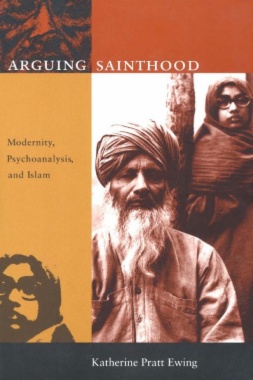In Arguing Sainthood, Katherine Pratt Ewing examines Sufi religious meanings and practices in Pakistan and their relation to the Westernizing influences of modernity and the shaping of the postcolonial self. Using both anthropological fieldwork and psychoanalytic theory to critically reinterpret theories of subjectivity, Ewing examines the production of identity in the context of a complex social field of conflicting ideologies and interests.
Ewing critiques Eurocentric cultural theorists and Orientalist discourse while also taking issue with expatriate postcolonial thinkers Homi Bhabha and Gayatri Spivak. She challenges the notion of a monolithic Islamic modernity in order to explore the lived realities of individuals, particularly those of Pakistani saints and their followers. By examining the continuities between current Sufi practices and earlier popular practices in the Muslim world, Ewing identifies in the Sufi tradition a reflexive, critical consciousness that has usually been associated with the modern subject. Drawing on her training in clinical and theoretical psychoanalysis as well as her anthropological fieldwork in Lahore, Pakistan, Ewing argues for the value of Lacan in anthropology as she provides the basis for retheorizing postcolonial studies.
- Contents
- List of Illustrations
- Preface
- Chapter 1. Hegemony, Consciousness, and the Postcolonial Subject
- Part I. The Tradition-Modernity Dichotomy as a Hegemonic Discourse
- Chapter 2. Sadhus and Faqirs: The Sufi Pir as a Colonial Construct
- Chapter 3. The Pir, the State, and the Modern Subject
- Part II. The Modern Subject and Conflicting Ideologies
- Chapter 4. Everyday Arguments
- Chapter 5. A Pir's Life Story
- Chapter 6. Stories of Desire: Reclaiming the Forgotten Pir
- Part III. Modern Respectability and Antinomian Desire
- Chapter 7. The Qalandar Confronts the Proper Muslim
- Chapter 8. The Qalandar as Trope
- Chapter 9. The Subject, Desire, and Recognition
- Afterword
- Glossary
- Notes
- References
- Index

